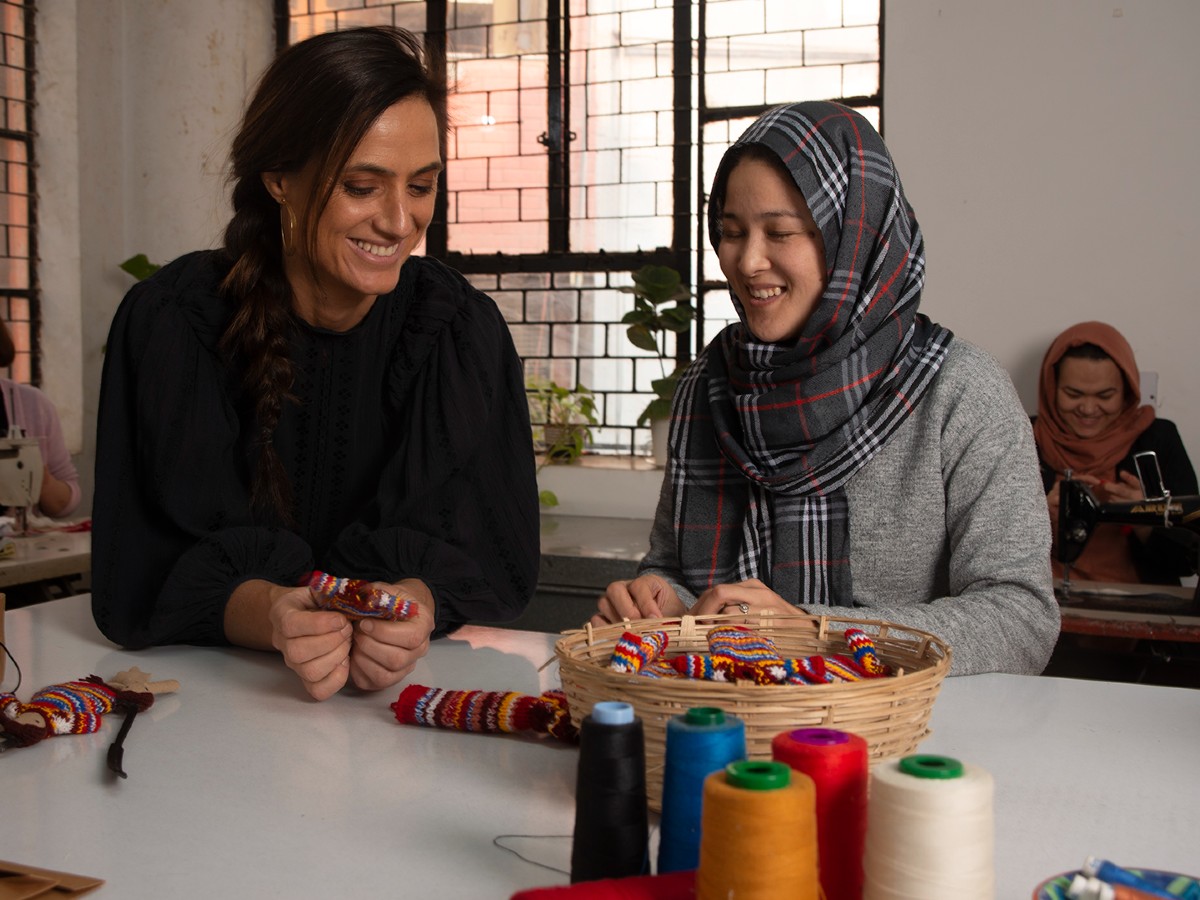
EXPORT QUALITY: Silaiwali caters to American and French fashion companies
When Bishwadeep Moitra, a yoga enthusiast, went for his session at 6.30 am on a cold winter morning of 2006, at the Sivananda Centre, Delhi, he could have never imagined that cupid would strike by the end of it.
He fell in love with French national Iris Strill, who was there to learn the art of calmness. It may have been an unromantic start, but the partnership has weathered time and tide. They got married in 2009, and are now parents to an 11-year-old daughter!
Iris had inherited the creative gene and while growing up was fascinated by things made by hand, an inherent part of her culture. A fine arts student, who first came to India in 1999 on a scholarship to do a PG diploma, she kept coming back to explore the country’s myriad art forms.
She conducted workshops with block printers in Rajasthan, then worked on how to modernise wool and then sold the final products to museums and shops all over the world.
This was the beginning of Iris, who wanted to start something of her own and help artisans market their work globally. She began advising them on trends, colours and worked with numerous fashion brands, manufacturers and garment factories.
Brittany (France), Iris’s hometown, has a history of intricately-designed textiles. She observed that the waste generated during production went to landfills. Up to 47% of fibre in fashion goes to waste.
“I was a visual journalist and quit in 2016. I was looking to start a social enterprise that would have the solidarity of ecology, so we began working with the Afghan women,” says Iris’s husband Bishwadeep.
This was in continuation with the training project Iris had started in Delhi’s Khirki Village, where Afghans made rag dolls with waste materials. Many of the Afghan women are living here on a medical visa.
In 2018, Silaiwali was launched with 10 such ladies, after talking to UNHCR’s arm Made 51, which markets refugee-made items to foster inclusion.
This breakthrough happened after Iris took part in a German international fair, where fair trade was being promoted.
The first response and an order was from a Swiss company, and then a volley of big groups followed. They showed interest in her sustainable offerings. Soon Americans followed and Iris made a series of products from their waste materials — key chains, tote bags to decorations.
Silaiwali works with excess, leftover and waste fabric, which is collected from all over the Capital including Sanjay Colony. It is then crafted into attractive knick-knacks.
“The business rests on the idea of a circular economy, upholding the virtues of upcycling (creative reuse), giving the marginalised [people] sustainable income to support their families. The Afghans work as a community. They are not used to travelling, so we run our workshop like a zanana (a place exclusively for women), make it close to their home for their comfort,” says Moitra.
Seeing this beautiful way of integrating ecology with the human spirit, famed French label Chloe placed an order with them, and then came Ulla Johnson.
“Unfortunately, many Afghans have left for Canada from India. Iris wants to set up a training centre there as well. We want them to get good jobs, encourage them to work with dignity, keep the artisanal work active, and not let their craft die due to the lack of preservation.
“Internationally, there is a great respect for these dying skills. It is traditional, so it lacks newness and this is where Iris assists them as she has worked globally with brands who have hi-end customers. Artisans need design intervention. In Europe you can see how luxury houses have used age-old Indian techniques and processes to create the most coveted ensembles — from Armani, Elie Saab to Zuhair Murad and others. Design must change every season. There has to be an osmosis of the contemporary with heritage,” says Moitra.
Their latest collaboration with Chloé has made them famous, dolls being the brand’s signature.
A limited-edition collection was designed to showcase Chloé’s design vocabulary, intermixing the concepts of upcycled fashion.
Silaiwali’s efforts have earned them revenue worth $3,00,000 (approx. Rs 2.5 crore). They conserved more than 11 metric tons of waste fabric in India. They have also collaborated with the likes of Emili & Eda, Banjanan, Nila Foundation, Lecoanet-Hemant etc.
Silaiwali is certified by WFTO (World Fair Trade Organization, Netherlands) and all their products have the WFTO mark.
The organisation works with the most persecuted Hazaras, an ethnic group living in the Hazaristan region of central Afghanistan. They were forced to escape Afghanistan due to persecution.
The women of the Hazara community are excellent at crochet work.
The organisation also works with Pashtun refugees, some of whom have now settled in Delhi and live on foreign aid.
Delhi hosted what organisers describe as the world’s first player auction in golf, launching ‘72…
An elderly woman recalls how her six-year-old granddaughter lay bleeding after a speeding car hit…
Municipal Corporation of Delhi plans a unified policy enabling RWAs to adopt and maintain parks…
A 17-year-old boy allegedly died by suicide after jumping before a moving train at Uttam…
Delhi High Court grants bail to 26-year-old Thar driver accused of mowing down two in…
Two Rohini men arrested for fatally stabbing one person and injuring another during a robbery…